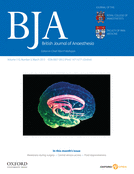
GENERAL ORTHOPAEDICS
Neuraxial block may be associated with a high risk for postoperative cardiac complications
This report has been verified
by one or more authors of the
original publication.
Br J Anaesth. 2013 Sep;111(3):382-90. doi: 10.1093/bja/aet120. Epub 2013 Apr 23.
7925 patients from the POISE trial were included in this post-hoc analysis regarding neuraxial block. The purpose of this analysis was to determine whether neuraxial block was significantly associated with the primary composite outcome (i.e., cardiovascular death, non-fatal myocardial infarction, or non-fatal cardiac arrest), myocardial infarction, stroke, and clinically-significant hypotension over 30 days post-operation. Results indicated that neuraxial block was associated with an increased risk for the primary composite outcome and myocardial infarction, but not stroke or death. There was a non-significant trend towards neuraxial block being associated with clinically-significant hypotension, and the administration of beta-blockers did not influence these results.
Unlock the full ACE Report
You have access to {0} free articles per month.Click below to unlock and view this {1}
Unlock NowCritical appraisals of the latest, high-impact randomized controlled trials and systematic reviews in orthopaedics
Access to OrthoEvidence podcast content, including collaborations with the Journal of Bone and Joint Surgery, interviews with internationally recognized surgeons, and roundtable discussions on orthopaedic news and topics
Subscription to The Pulse, a twice-weekly evidence-based newsletter designed to help you make better clinical decisions
Exclusive access to original content articles, including in-house systematic reviews, and articles on health research methods and hot orthopaedic topics
Or upgrade today and gain access to all OrthoEvidence content for just $1.99 per week.
Already have an account? Log in


Subscribe to "The Pulse"
Evidence-Based Orthopaedics direct to your inbox.
{0} of {1} free articles
Become an OrthoEvidence Premium Member. Expand your perspective with high-quality evidence.
Upgrade Now













































































